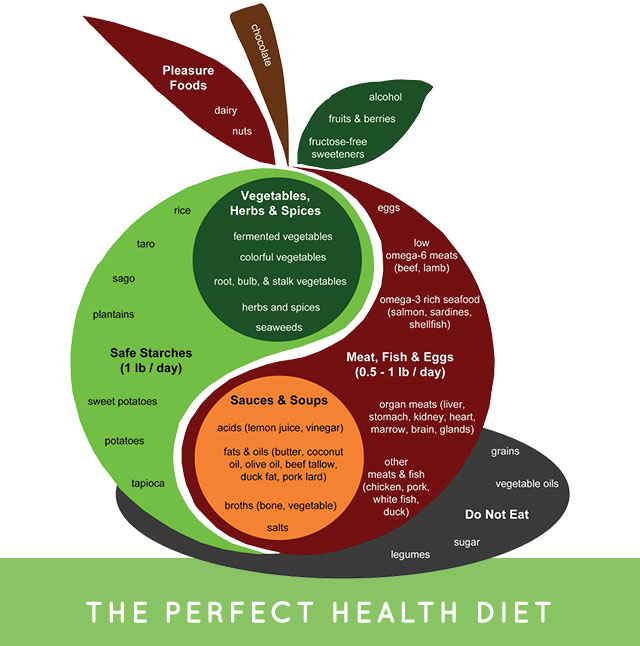Paul Jaminet, PhD, talks with me about the foundations of his Paleo-based Perfect Health Diet. He and his wife, a cancer reseacher, spent seven years developing and researching the tenets of this diet.
Transcript
Click here to view the full transcript for #14 The Perfect Health Diet with Dr. Paul Jaminet.
Both have successfully healed their own “middle-age” and chronic health problems with this diet and have learned a great deal about the benefits – and pitfalls – of the Paleo diet that they would like to share. Learn more about it on Perfecthealthdiet.com.
Their Beliefs
- Disease, premature aging, and impaired health have four primary causes: malnutrition, food toxicity, evolutionarily discordant lifestyles, and chronic infections by bacteria, viruses, fungi, and protozoa.
- These causes go together. People who eat toxic, nutrient-poor diets are more likely to contract chronic infections and do not easily recover from them.
- Yet the body has amazing powers of recovery. On a healthy diet, the immune system can tackle and defeat most infections, especially with the aid of antimicrobial drugs.
- A diet like the Perfect Health Diet should be the first treatment option in most diseases and an adjunct to therapy in all.

Paul and Shou-Ching Recommendations
- About 3 pounds [1.4 kg] of plant foods per day, including:
- About 1 pound [0.45 kg] of safe starches, such as white rice, potatoes, sweet potatoes, and taro;
- About 1 pound [0.45 kg] of sugary in-ground vegetables (such as beets or carrots), fruits, and berries;
- Low-calorie vegetables to taste, including fermented vegetables and green leafy vegetables.
- One-half to one pound [0.25 to 0.5 kg] per day of meat or fish, which should include organ meats, and should be drawn primarily from:
- ruminants (beef, lamb, goat);
- birds (especially duck and wild or naturally raised birds);
- Shellfish and freshwater and marine fish.
- Low omega-6 fats and oils from animal or tropical plant sources, to taste. Good sources include:
- butter, sour cream, beef tallow, duck fat;
- coconut milk or oil
- palm oil, palm kernel oil, olive oil, avocado oil, macadamia nut butter, almond butter, cashew butter
- Acids to taste, especially citric acid (lemon juice, lime juice, orange juice, grapefruit juice), lactic acid from fermented or pickled vegetables, vinegars, tannic acids from wine, and tomatoes.
- Broths or stocks made from animal bones and joints.
- Snacks or desserts from our pleasure foods: fruits and berries, nuts, alcohol, chocolate, cream, and fructose-free sweeteners like dextrose or rice syrup.
By weight, the diet works out to about 3/4 plant foods, 1/4 animal foods. By calories, it works out to about 600 carb calories, primarily from starches; around 300 protein calories; and fats supply a majority (50-60%) of daily calories.
In the shadow of the apple are foods forbidden because of their high toxin content. Notably:
- Do not eat cereal grains — wheat, barley, oats, corn — or foods made from them — bread, pasta, breakfast cereals, oatmeal. The exception is white rice, which we count among our “safe starches.” Rice noodles, rice crackers, and the like are fine, as are gluten-free foods made from a mix of rice flour, potato starch, and tapioca starch.
- Do not eat calorie-rich legumes. Peas and green beans are fine. Soy and peanuts should be absolutely excluded. Beans might be acceptable with suitable preparation, but we recommend avoiding them.
- Do not eat foods with added sugar or high-fructose corn syrup. Do not drink anything that contains sugar: healthy drinks are water, tea, and coffee.
- Polyunsaturated fats should be a small fraction of the diet (~4% of total calories). To achieve this, do not eat seed oils such as soybean oil, corn oil, safflower oil, sunflower oil, canola oil, or the like.
We highly recommend certain foods for their micronutrients. These include liver, kidney, egg yolks, seaweeds, shellfish, fermented vegetables, and bone broths.
About Paul Jaminet
Paul Jaminet, Ph.D. Paul was an astrophysicist at the Harvard-Smithsonian Center for Astrophysics, became a software entrepreneur during the Internet boom, and now provides strategic advice to entrepreneurial companies while pursuing research in economics (see pauljaminet.com for more information). Paul’s experience overcoming a chronic illness has been key to our views of aging and disease. Paul can be reached by email to pauljaminet@perfecthealthdiet.com.
About Shou-Ching Shih Jaminet
Shou-Ching Shih Jaminet, Ph.D. Shou-Ching is a molecular biologist and cancer researcher at Beth Israel Deaconess Medical Center and Harvard Medical School, and Director of BIDMC’s Multi-Gene Transcriptional Profiling Core. Shou-Ching was born in Korea to Chinese parents, grew up in Korea, attended college at National Taiwan University in Taipei, and graduate school at University of Newcastle in Australia, before coming to the US to work at Sloan-Kettering Cancer Center, Children’s Hospital Boston, and Beth Israel Deaconess and Harvard Medical School. Her publications may be found by searching Pubmed for “Shih SC” (through Sep 2011) and “Jaminet SC” (since Sep 2011).










